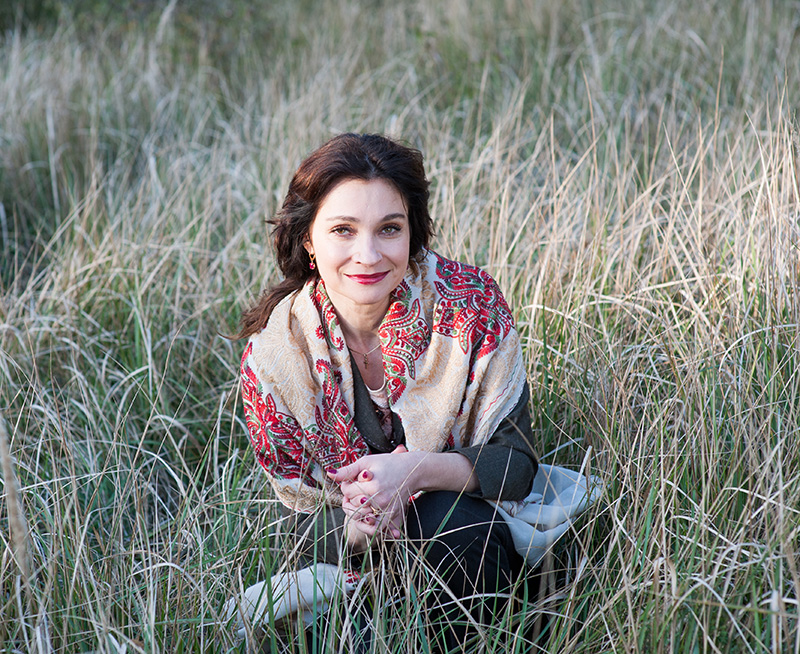
What does it mean to be a Hungarian from Carpathian Ruthenia?
Carpathian Ruthenia was part of Austria-Hungary until World War I, then Czechoslovakia, before World War II Carpatho-Ukraine was proclaimed there for a short time, then it returned to Hungary, after the war it was incorporated into the Soviet Union, and finally became a part of independent Ukraine. We laugh that my family, not even coming out of their own backyard, lived in many different countries. Different languages are present in the area and this is obvious given the history of the place. Hungarian, Slovak, Romanian, German, Jewish and Russian minorities live here. My next door neighbours only spoke Slovak at home, at school I had friends who fluentlyy spoke Yiddish.
Our house was bought by our parents from a well-known Russian writer, but a Czech physician had lived there before. The last time I was with them, I went down to the basement. The name of its producer who installed it were written on it. Each word was in a different language - Hungarian name, Czech and German surnames, French company, street name written in German and the name of the city in Czech... This is very typical for Carpathian Ruthenia. Apart from the number of languages present in the area, various religions function side by side. This is a very specific place on the map of the world, where so many different people can live in peace with each other and families are mixed.
What's your family like?
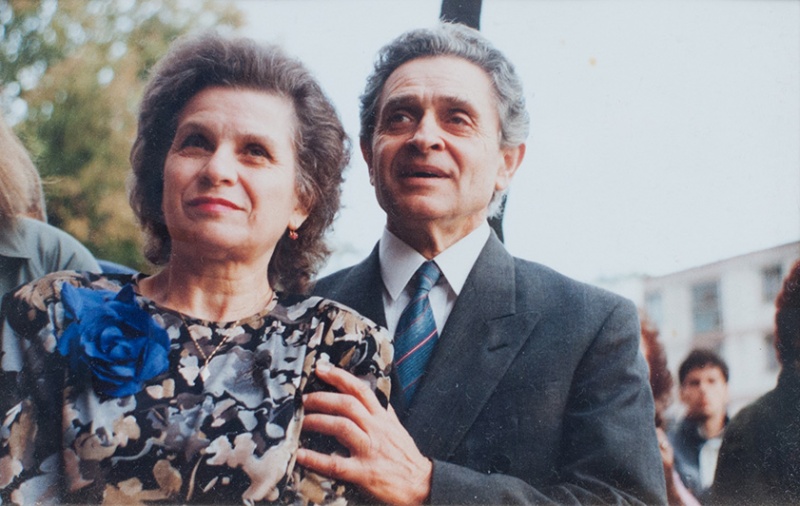
Maria i Ivan Korszyńscy
My mother, Maria nee Borbély, is Hungarian through and through, while my father, Ivan Korszyński, comes from a mixed family. Both my dad's grandmothers were Hungarian, but my grandfather Korszyński was Polish, and the other one was Romanian. As far as I know, at the turn of the 18th century, our ancestor Korszyński settled in Carpathian Ruthenia, where the Austrian authorities granted him land for his military services. Mom's family has always lived in these areas. My father loves Ukrainian culture very much and raised us with love for Ukraine and my mother with love for Hungary. We went to a Ukrainian school, during breaks and on the street we talked in Russian, and at home in Hungarian. We didn't have mish-mash in our heads, it was natural. Today I speak Polish every day, but I think in Hungarian. I speak Hungarian with God, but I pray in the Old Church Slavonic language, just as my father taught us. My father is an Orthodox believer, my mother is a reformer from my great-grandfather (Calvinist), and I and my sisters are baptized in the Greek Catholic Church. After the war and the Stalinist regime, enormous religious persecution continued. Many Orthodox priests cooperated with the Soviets, so my father decided to baptize us in the Greek Catholic Church because he knew the local priest, with whom he was in exile together and trusted him the most. We were baptized in the basement, in such a big secret that I learned about who my godparents were only at my own wedding. I really like Sunday mornings in my family home when everyone is getting ready for their church. Then we meet - at home or for ice creams in the town and tell each other what the sermons in our churches were like, without judgiong, sharing our spiritual and theological experiences. It's very enriching. We don't argue, we don't compete. Sometimes when Grzegorz and I say the Lauds, my mother, who is a Protestant, willingly joins us. Then I take the Hungarian breviary and read it in two languages.
Your family experienced persecution in Stalinist times.
My father was sent to a labour camp, among other things, for going to an Orthodox Church. He spent nearly eight years in the Spassk labour camp in Kazakhstan. It was a camp of the strictest regime, a death camp, described, among others, by Solzhenitsyn in the "Gulag Archipelago".
How did your father find himself in the labour camp and how did he survive it?
Dad was arrested twice - the first time in 1945, when he was 17 years old. He was in a group of young people who provided food to the partisans fighting the Soviets in Carpathian Ruthenia. He told me that nine investigators trampled his spine at that time. He didn't turn anybody in. The investigator threatened his father that if he didn't give him one name, he'd die in Siberia. Daddy answered him: "It's not up to you." "And who is it up to?" the investigator asked. "God." "How do I understand that?" asked the investigator. "You're going to do as He tells you." said my dad. Then his assistant leaned over to the investigator's ear and said: "Comrade Colonel, he's a fanatic." Years later, this man found himself on the operating table with my father... My father was released in order to be followed, but he did not lead them to the other members of the group. He managed finish school and get a place at a medical school. After that, there was no need for any evidence to arrest him again. They saw him go to church, speak Ukrainian, not Russian, and that was enough. On the second occasion he was sent to the labour camp. He was 19 years old at the time. He worked in a quarry in the camp. He got very seriously ill there. He was so starved and exhausted that he was close to death. He didn't have the strength to work, so his friends were covering for him, working for him. He ended up in a prison hospital, where the head of the prison was a Hungarian, Jozsef Cservenyi, a well-known doctor from Budapest. When he found out about the boy from the Carpathian Ruthenia region, he was so happy that he could talk to someone in Hungarian that he decided to save my father. When my father recovered, the doctor kept him on at hospital, where my father worked as a feldsher. Later, a prominent surgeon, Professor Sergei Kolesnikov, who was previously Deputy Minister of Health and Chairman of the Red Cross in the Soviet Union, was sent to the same camp. He's the one who trained my dad to be a doctor. He taught him at the camp. At the end of his sentence in the labour camp, Dad was assisting him with the operations. Kolesnikov became for him almost like a second father, and my dad became for him like a son he never had. When, many years later, my husband was in Moscow and visited the professor's widow, there were three portraits hanging on the wall of their apartment: that of Kolesnikov, his wife and my father.
Dad left the camp after Stalin's death and was backlisted, so he didn't have a chance to graduate, but Kolesnikov, who was rehabilitated and returned to work, helped Dad to resume his studies, however only at the university in Belarus. The KGB harassed my dad to get him to cooperate. But he never did. He rejected recruitment offers four times. Today, my dad is very weak; it is clear that heaven is already calling him. But is finishing writing his next book of memoirs. He tells us that the Spassk Labour Camp was his biggest university. He met a lot of noble and beautiful people there. He thinks he should write about them because they've been forgotten.
And how did you get to know Grzegorz and how did it happen that you settled in Poland?
I was a student at the opera department of the Lviv Conservatory. In the autumn of 1992, an alternative music festival was held, during which I performed. During a break I met Grzegorz, who was then a correspondent of "Życie Warszawy" in Ukraine. We were introduced by a common friend. Later on Grzegorz made friends with a close friend of mine, with whom I rented a flat. He once visited her when she got sick and then I decided to cook mămăligă. This is a very popular dish not only in Romania, but also in Carpathian Ruthenia. I prepared a mămăligă with sheep’s milk cheese and when I gave it to Grzegorz, I saw that he was very surprised. Shortly before that, he wrote a report in which he described his journey through Bukowina in Romania - wherever he appeared, he was served mămăligă and was told that a journalist named Angelika was there before him. He's been on her heels all along, but he hasn't met her. That's why he was surprised when he came into contact with another Angelica, who gave him a mămăligă. We started going out, and after five days Grzegorz asked me to marry him. We got married in 1993. I was 22 at the time. We had out civil wedding in my hometown of Uzhhorod and in Wroclaw had a church wedding. We had four receptions. All of them were very modest - the first one was prepared by my parents in Uzhhorod, the second one we had in Lviv for my friends, the third one held by by Grzegorz's parents in Wroclaw and his very large family came, and the fourth one we organized in Wroclaw for Grzegorz's friends.
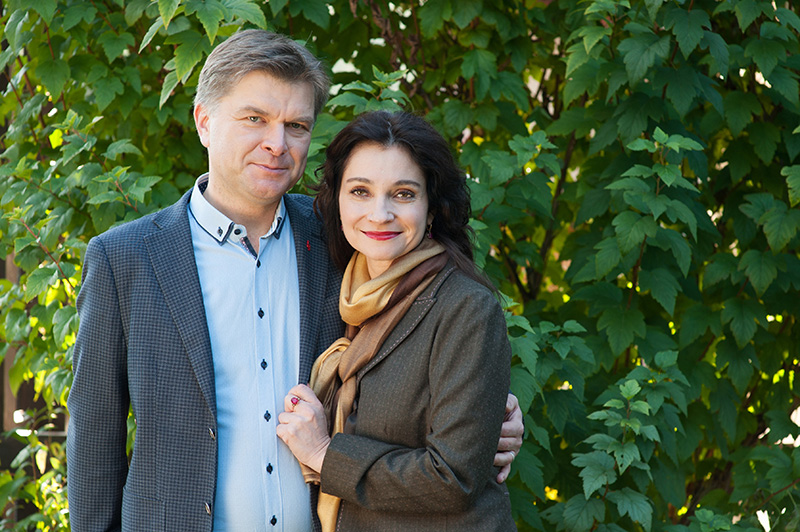
Angelika i Grzegorz
Did your family home experience help you adapt to a new culture and language after moving to Poland?
For me, the first shock was the trip to Lviv to study. Suddenly I found myself in a city where everyone spoke one language, i.e. Ukrainian, but here and there Russian language could be heard. Earlier, when I went to the market, I had to use at least four or five languages to get along, and life here was so simple! And the people around me were so much alike. In Carpathian Ruthenia, people are much more colourful, both in terms of their beauty and mentality, which is not very uniform. Most clearly God was preparing me for a move to Poland.
What was the most important thing that you lacked after moving to Poland?
After the wedding I stayed in Ukraine for a year and did my bachelor's degree and then Annamaria was born. I came to Poland with a 9-month-old baby. At the beginning I missed everything - family, language, studies, friends, work, that scene, Carpathian Ruthenia, Lviv, Ukraine... Before coming to Poland I led a very intensive life - I studied, sang, recorded, partied. Suddenly, I found myself in a country that I did not know, whose language I did not speak, with all the unknowns about the future. But I had Grzegorz, whom I loved very much and thanks to that I could bear the longing for what I left behind. We also soon lost our second child, which I carried under my heart. It was a tragedy, but it was not pointless, because I believe that our son Serafin prays for us very much. After this event we met the Pauline fathers from Długa Street in Warsaw. I made friends with them. At the request of my fathers, I began to give them singing lessons. In the Soviet Union, churches were closed because of persecution, and I had such a great hunger for a church that when I came to Poland, I started going to Mass every day. After one confession I received penance to go to neocatechumenal catechesis. We went to them with Grzegorz and thus we entered the community. I recently heard from a Hungarian Franciscan that when an unborn child leaves, it is necessary to set tables, or celebrate, because you are sure that one of your children is certainly in heaven, and this is a great blessing. I firmly believe that we had the opportunity to get to know the Church more closely and to enter the community thanks to Serafin’s intercession.
Have you managed to build close, friendly relations with people from Poland?
In my experience Poles like Hungarians very much and are open to foreigners, especially those from neighbouring countries. I have such close ties with some people here that I feel as if it were my family. There are no relatives of Grzegorz's or mine living in Warsaw, and yet I have many godchildren here. I also think that the fact that we had over 400 guests at Annamaria's reception in Warsaw, and about 700 came to the wedding.
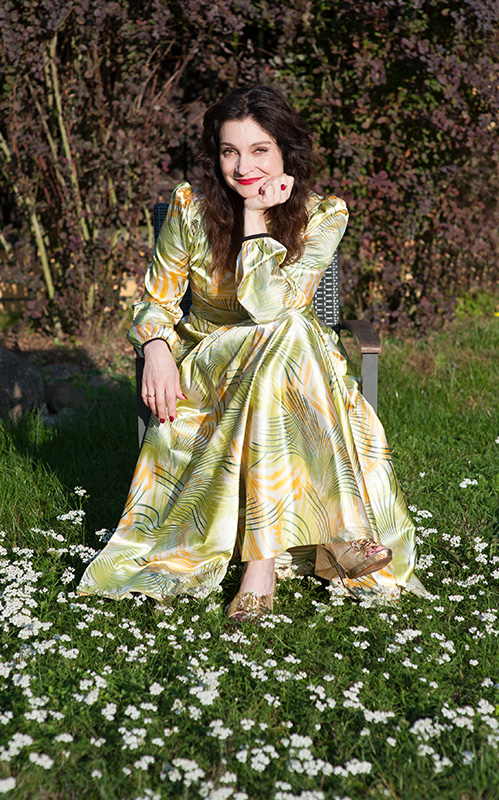
How does the Hungarianness of your family look like on a daily basis?
My children know Hungarian because I have been speaking to them in this language since I was born. They know a lot of Hungarian folk songs. I remember my mother always used to sing them, doing laundry or cooking, so I used to sing to my children the same way. We were also lucky that my godfather, who lives near Transylvania, used to invite them on holiday every year. My cousin's children also went there, so they played together. They went to the Tisza river, ate bread with lard or fatback with Hungarian red pepper. In Carpathian Ruthenia, apart from Hungarian, our children also learned the Ukrainian language, learned the liturgy of the Eastern Church, sang Ukrainian folk songs, and have Ukrainian friends.
Once, when I was at the Hungarian embassy, the consul asked whether I would like to apply for Hungarian citizenship for myself and for the children. The consul assured me that the procedure is not long and difficult and added that citizenship is due both to me and to the children. When I got home, I thought about it for a long time. At one point I felt as if all my dead Hungarian ancestors were looking at me from the netherworld and I almost heard them say: "How come? You're still wondering? You belong to us! "I felt so stupid. I contacted the consulate and, after a while, we were not granted Hungarian citizenship as much as Hungarian citizenship was given back to us, because my family never renounced it - it was taken away against its will. What happened afterwards is very interesting, because when the citizenship was restored to us, I noticed that this formal act was followed by actual actions - children started to speak to each other more often in Hungarian, started to read Hungarian literature and learned many Hungarian poems, which touched me very much. They felt that they belonged to a nation not only theoretically, but also practically. When Annamaria was to decide on her foreign language course during her studies, she chose Hungarian. Kamila attended Hungarian studies after graduation. Everything seemed to indicate that Noemi would decide to go to the Music University, but she also chose Hungarian studies. I absolutely did not initiate it, it came from the children themselves.
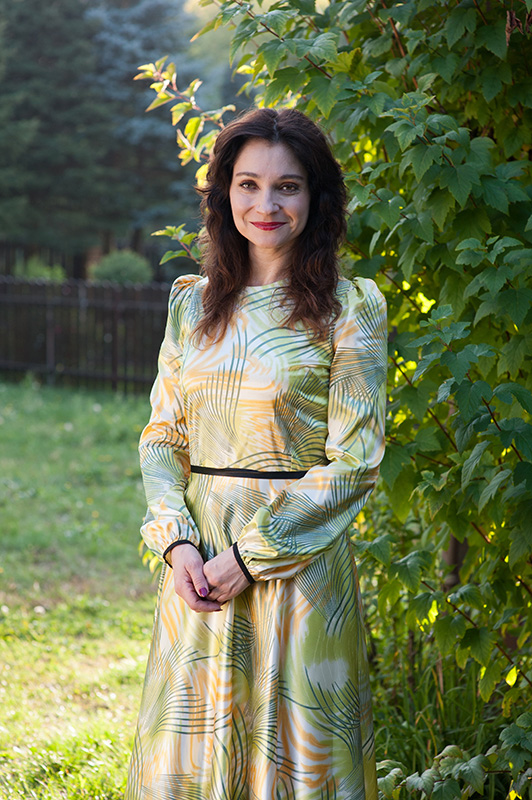
Your husband writes a lot about the culture, history and present day of Hungary. Does he speak Hungarian?
He knows basic sentences: "Come here", "Brush your teeth", "Close the door." (laughs) Grzegorz is very interested in Hungarian culture. He loves the sound of Hungarian language and Hungarian cuisine. He loves Hungarian wine. It is no coincidence that he brought 160 litres of Hungarian wine from Eger for his daughter's wedding. Although we also had Ukrainian vodka.
Apart from wine, did Annamaria's wedding have any other Hungarian accents?
When Annamaria said that Eliasz had asked her to marry her, we were very pleased, although it was surprising to us that it happened literally after two months of acquaintance. My daughter reminded us then that Grzegorz asked me to marry him after five days. My sisters were also asked to marry very quickly, one after two weeks and the other after a month's acquaintance. Apparently, it's a family tradition.
We talked to our daughter about how their wedding should look like, because they chose August for their wedding, and this is a Marian month. I asked them if they'd like to have an image of Mary on the invitation. The idea was very much appreciated. We asked our close friend, painter Magdalena Bielecka, to make an icon and that's how the image of the Blue Madonna or Blue Mary was created - that's what we call her in the family. Anyone who was invited to the reception and the wedding received a likeness of that Madonna. In this way Annamaria and Eliasz took Mary as patron saint of this important event in their lives. The focal point was the wedding Mass. We decorated the church with white and blue flowers, people were a little surprised, because usually white flowers are used, but it was a Marian accent. On the side altar stood the icon of the Blue Madonna. It was a surprise for me when young couple, according to Hungarian custom, swore allegiance to the cross. Eliasz made this promise in Polish and Annamaria in Hungarian. I held on tight throughout the wedding, but that was the moment when I cried out of emotion. God gave me such a gift that I felt a little at home. Then our younger daughters said that they were planning more Hungarian elements for their wedding celebrations. They've figured it all out, but they're keeping it a secret.
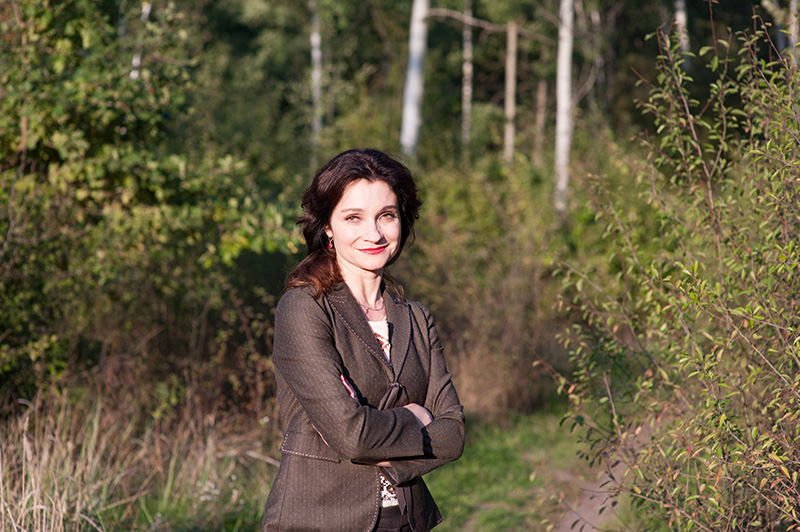
Was the organization of such an international reception difficult?
It happened that we organized three receptions for our daughter. The first one is for families from Poland and Carpathian Ruthenia region as well as for closest friends. Then we invited our friends from our communities to a barbecue. The third reception was held in Carpathian Ruthenia, in my native Uzhhorod, and there we hosted the whole family not only from Carpathian Ruthenia, but also from Hungary and the Czech Republic. Before this third reception we celebrated Holy Mass in a Greek Catholic Church, during which there were old Orthodox Slavic accents. These are beautiful customs and the family of Eliasz, who was in Carpathian Ruthenia for the first time, was very surprised and moved.
After the reception we were surprised by our youngest son - 15-year-old Augustyn. He went to his grandfather's room and said that God willing, he would like to study medicine in order to be a doctor in the future. My dad was very touched. But that wasn't all, because my son said: "Grandpa, you have only daughters, they already have other names, so I decided to add yours to my name." Daddy was in tears.
Thank you so much for talking to me.
Angelika Korszyńska-Górny, singer, composer, performs solo and with 2Tm2, privately wife of journalist and columnist Grzegorz Górny, mother of Annamaria, Kamila, Noemi, Jeremiasz and Augustyn.
rozmawiała Marta Dzbeńska-Karpińska
zdjęcia: Marta Dzbeńska - Karpińska